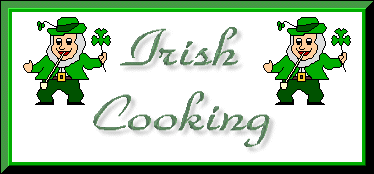
|
Irish Basics
What you should know before
trying some of these Irish
Recipes.
|
| Many of these items
can be found in supermarkets specializing in import goods or specialty
Irish Stores. |
| Allspice:
Also called pimento or Jamaican peppers, this berry
combines the flavors of cinnamon, cloves and nutmeg. Used in both
sweet and savory dishes. Allspice is sold whole or ground. |
| Bay Leaves: The
leaf of an evergreen laurel tree, also known as cherry laurel. Used
as a flavoring in curries, beef dishes, pies, soups and preserved fish. |
| Black Pudding:
A large black sausage made with pig's blood, suet,
steel-cut oats and seasonings, encased in pig's intestine. High in
fat, carbohydrate and iron. |
| Blanching: To
plunge food into boiling water for a few minutes to partially cook, but
retain crispness. |
| Butterfly Pork Steaks:
These are cut from the mid loin section of a pig.
The steak is about 1 inch thick, cut almost in half and opened out. |
| Buttermilk:
A cultured milk product. It is produced from
the liquid left after churning butter. In Irish Cookery it has been
used since earliest times both as a beverage and for cooking. If
buttermilk is unavailable sour milk may be used. Add one teaspoon
of lemon juice or vinegar to each cup of milk. |
| Cod:
A medium to large fish with white, moist flesh and a mild flavor.
Found in the Atlantic and Pacific oceans. If cod is unavailable any
firm, white fish fillet or cutlet can be used instead. |
| Demerara Sugar:
A white sugar treated with molasses to produce a pale golden sugar.
Turbinado or brown sugar can be substituted. |
| Dripping:
Fats drawn from beef or sheep. Dripping can be purchased in solid
blocks from supermarkets or butchers. |
| Gammon:
The hind of a cured side of bacon, used for ham and ham steaks. |
| Golden Syrup:
A light-colored syrup made from crystalline sugar. Dark corn syrup
can usually be substituted. |
| Guinness:
Arthur Guinness introduced his famous beer to the world in 1759. Guinness
is a heavy porter ale - the original dry stout made from barley water,
hops, and yeast. If you find Guinness too strong, a light ale may
be substituted. |
| Irish Mist:
Irish Mist is a liqueur with a history dating back over 13 hundred years.
It is 35 % Alc/Vol. Irish cream liqueur may be substituted but use
slightly more (to taste) as it is not as strong in flavor. |
| Irish Oatmeal:
Also known as Scottish oatmeal or steel-cut oats. Can
be purchased from health food stores. |
| Irish Whiskey: Barley-malt
and grain whiskey, distilled in Ireland and matured for seven years. |
| Leeks: After
the roots and tough dark green tops and outer layers are removed the leeks
must be washed to remove all dirt and grit. It is best to wash them
in warm water to remove all dirt easily. |
| Mutton: The
meat of a matured sheep (over three years). It is best suited to
moist methods of cookery, such as braising, boiling and stewing.
Lamb can be substituted. |
| Potatoes:
Potatoes are a staple throughout Ireland, with most homes in counties having
their own patch. They are used in soups, stews, breads and pastry and many
traditional potato dishes. It is generally best to use old floury
potatoes in these recipes as they break down easily during cooking to produce
a thick creamy texture. |
| Seasoned Flour:
Seasoned flour is used to protect foods and crisp coating
when pan frying. Combine all purpose flour with a good sprinkling of salt
and white pepper. |
| Spanish Onions:
A large onion with a purple skin and pinkish flesh. |
| Treacle:
Dark brown, viscous, uncrystallized syrup obtained from refined sugar.
It is darker and stronger in flavor than golden syrup. Molasses can
usually be substituted. |
| Turnips:
A white fleshed root vegetable with a distinct flavor used in soups, stews
and casseroles. |
| Unbleached Flour:
Wheat flour which has not been through the bleaching process. It
is creamier in color and has a better flavor that bleached flour. |

|

|

|